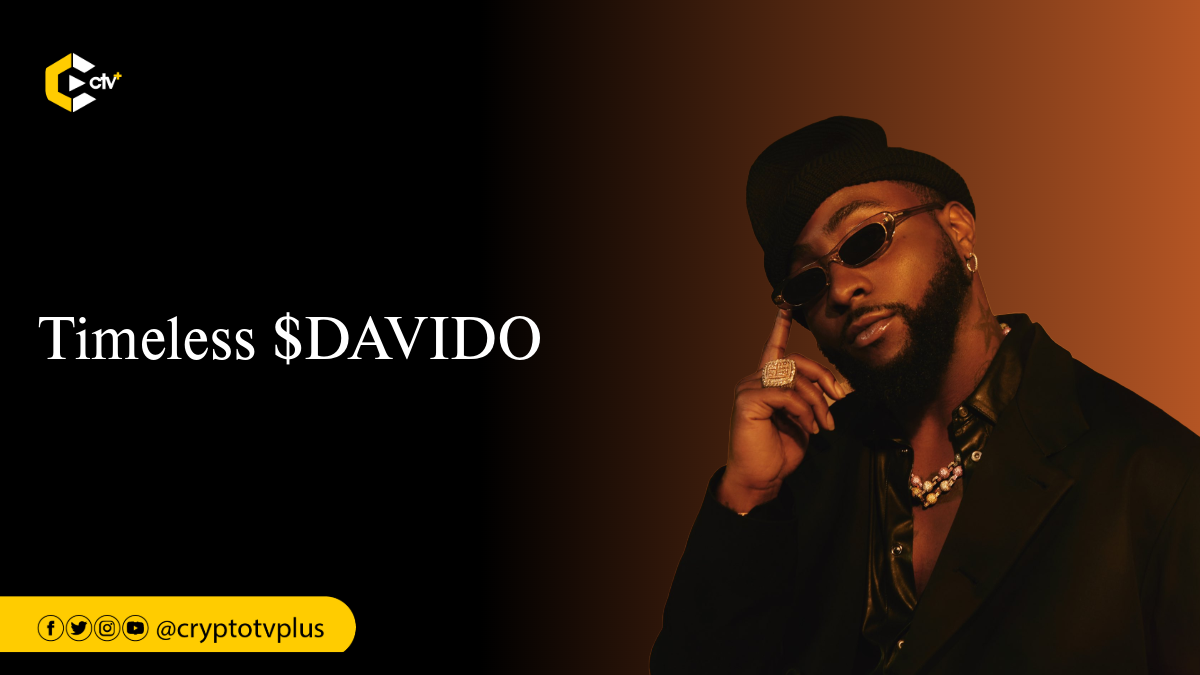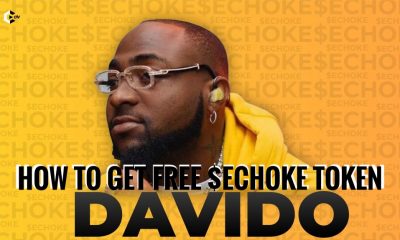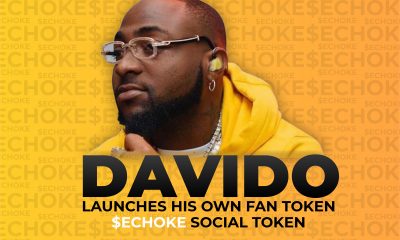News
The rise & controversy of Davido’s $DAVIDO meme Coin

The social media landscape is abuzz with the news that Nigerian music superstar Davido is launching his own meme coin. Meme coins have transcended their origins as humorous, novelty tokens to become a significant segment of the cryptocurrency market.
Over the years, traders and investors have reaped millions of dollars from leading crypto memes. According to CoinMarketCap, the meme coin market now boasts a staggering market capitalization exceeding $63 billion, with daily trading volumes surpassing $10 billion.
The prominence of meme coins is evident in their positions among the top cryptocurrencies by market capitalization. Dogecoin and Shiba Inu, two of the most well-known meme coins, have secured spots within the top 10. Additionally, meme coins such as Pepe and Dogwifhat are ranked within the top 30 cryptocurrencies.
Given the rapid growth and volatility of meme coins, alongside the prevalence of scams known as rug pulls, the introduction of the $DAVIDO token raises intriguing questions. Considering Davido’s immense popularity, charismatic persona, and reputation, many investors are curious whether the $DAVIDO token might be a worthwhile investment.
What is $DAVIDO?
$DAVIDO is a recently launched memecoin in the Nigerian cryptocurrency market, associated with the Afrobeat superstar Davido, whose real name is David Adedeji Adeleke. Davido, a Nigerian-American singer, songwriter, and record producer, has a substantial influence both locally and internationally.
The $DAVIDO memecoin made its debut on May 29, 2024, at approximately 6:30 PM WAT, as per Dexscreener data. Remarkably, within just four hours of its launch, the coin hit an all-time high price of around $0.01078 and achieved a market capitalization of $10 million. This rapid ascent sparked significant excitement and conversation across the Nigerian X (Twitter) community.
Despite lacking the conventional elements of a structured cryptocurrency project, such as an official website or whitepaper, the $DAVIDO token has amassed over 16,000 holders in a short span of time. This impressive adoption rate can be attributed to Davido’s massive popularity and the viral nature of memecoins.
Interestingly, $DAVIDO is not the first crypto endeavor connected to the musician. Davido’s previous involvement in the crypto space has set a precedent, further fueling interest and speculation around this new venture.
Backlash and support on $DAVIDO
Amid the excitement surrounding the project that has yet to achieve a new all-time high (ATH), there has been a mixed reaction from the Twitter community regarding the legitimacy of the memecoin in question.
An X (Twitter) account, The Tradeguru, voiced criticism, claiming that the Solana and Drip project has failed the crypto community by endorsing the Nigerian musician Davido during the launch of the memecoin. The user tweeted, “@solana and @drip_haus endorsed a celebrity scammer @davido who rugged the community of over $600k under 24 hours. $DAVIDO pulled over 1995.40% and was trending #1 on Dextools within the hour.”
Adding to fuel the buzz around the token were posts by Solana, Drip, and Phantom — a popular Solana wallet provider — tagging Davido on X. Posts like this are often construed as endorsements. However, it raises the question: did Solana, Drip, and Phantom tag Davido to endorse the memecoin launched in his name, or was it for a different reason?
In response to the confusion surrounding the endorsement of memecoin launched by Davido, Solana clarified that their post about Davido had nothing to do with any token launch but was related to a music deal the musician had agreed upon with Drip.
They stated, “This is a welcome tweet to an artist who decided to share their music using on-chain tools enabled by @drip_haus. This isn’t an endorsement of any token or links being shilled in the comments.”
Similarly, Drip did not make any comments that suggested they were supporting the memecoin. Although Ansem – an X user known for his affiliation to celebrities and their memecoins, who hosted an X Space with Davido, the CEO of Drip, and other Web3 celebrities, discussed the launch of a memecoin, the conversation focused on how crypto can help musicians connect with their fans, reward them, and earn without intermediaries.
Drip merely noted on their X account, after tagging Davido, that fans could subscribe to their services to receive music collectibles from Davido. Phantom also responded to a post made by Davido, which further fueled speculation.
In an X post, Davido mentioned that the team sold part of the token for marketing purposes, asserting that his intention was for his community’s benefit rather than personal gain. He also remarked on his surprise at the number of his fans who were crypto natives.
Meanwhile, another account, BecauseBitcoin, defended against allegations of a rug pull involving $DAVIDO, tweeting, “[𝕏] Solana’s official 𝕏 account welcomed singer Davido, who issued the memecoin $DAVIDO with a ‘pump and dump’ scheme. He bought 20.3% of the tokens for 7 $SOL and sold them for 2,791 SOL profit.”
Despite the negative feedback, some investors reported profits. One user, Sheyi04, posted, “I borrowed small cash from my $WKC and risked investing in $DAVIDO, made gains, sharply cashed out and I knack am back to $WKC in a space of 8hrs”.
On the morning of the controversy, Bitmart, a well-known crypto exchange, announced that $DAVIDO would be listed for trading at 10:00 AM WAT. Similar to posts made by Solana, Drip, and Phantom, announcements of a project listing on an exchange typically generate positive buying activity due to increased exposure.
Following Bitmart’s announcement, $DAVIDO saw a significant rise, indicating bullish sentiment among investors. Later, in an X Space hosted by CryptoLord, speculation arose about $DAVIDO potentially being listed on Bybit, further fueling interest and activity around the token.
Acknowledging the inherent volatility of memecoins, an X user named Julius Elum suggested that the team behind $DAVIDO could strategically market the token to align with the public persona of Davido.
He pointed out that “people from other countries including all of the celebrity coin launched recently except for $MAGA dumped madly or rugged after launch”. Elum argued that the recent downward trend of $DAVIDO should not be viewed as an anomaly.
This series of events underscores the complex and often tumultuous nature of the cryptocurrency market, especially with the involvement of high-profile celebrities and in memecoins. The initial excitement and subsequent backlash illustrate the nature of the crypto market. It can be excitingly rewarding but it can also be tough for celebrities trying to get into the crypto market.
For Solana, Drip, and Phantom, the episode serves as a reminder of the influence their endorsements can wield and the potential ramifications. As for Davido, navigating the crypto space requires balancing his celebrity status with the expectations and scrutiny of the crypto community.
Other crypto projects connected to Davido
Davido, the renowned Nigerian artist, has been involved in several cryptocurrency ventures, they are Rapdoge, Racksterli, and Echoke. Each project has garnered significant attention due to his high-profile endorsements and the inherent risks and controversies surrounding these ventures.
Racksterli, created by Michael Oti, was a financial scheme that gained considerable traction with endorsements from prominent Nigerian figures, including Davido in mid-2021 and Senator Dino Melaye. The scheme promised investors substantial returns, often doubling their investments within just 45 minutes, boasting an impressive success rate.
However, in June 2021, Racksterli collapsed, leaving numerous investors empty-handed, unable to reclaim their initial investments or the anticipated returns. The fallout from this collapse sparked widespread criticism and scrutiny of the celebrities who had endorsed the scheme.
In the crypto market, Davido promoted Rapdoge, a cryptocurrency that generated buzz within the crypto community. He actively encouraged his followers on social media to invest in RapDoge tokens, raising suspicions about the legitimacy of the coin and concerns over a potential pump-and-dump scheme. Critics questioned whether Davido’s endorsement was a genuine investment opportunity or a ploy to inflate the coin’s value artificially.
Davido’s involvement in cryptocurrency ventures extends to the Echoke Social Token ($ECHOKE), a Fan Token project developed by Bitsika Africa in late 2021 in collaboration with the crypto platform Omegoat. Built on the BNB Smart Chain (BSC), the Echoke Social Token aims to revolutionize fan engagement in the entertainment and media industry.
Traditionally, fans support their favorite artists by purchasing music, attending concerts, and buying merchandise, often without receiving any tangible benefits in return. Echoke seeks to change this dynamic by transforming fans from passive spectators into active influencers and stakeholders, thus driving a more engaged and empowered fan community. But the token seems to have long been abandoned. The last post on their Telegram group was in Q1, 2022. The same can be said for the Omegoat X (Twitter) account.
The broader Fan Token landscape includes over 86 different tokens, with a collective market cap of approximately $1.54 billion, as reported by Coinranking. Leading the pack is Chiliz (CHZ), the largest fan token provider by market cap, valued at $1.38 billion.
Other notable fan tokens include the Paris Saint-Germain Fan Token (PSG), Juventus Fan Token (JUV), AC Milan Fan Token (ACM), and Atletico Madrid Fan Token (ATM). These tokens represent a growing trend in the intersection of cryptocurrency and fan engagement, providing fans with new avenues to connect with and support their favorite teams and artists.
Is $DAVIDO a good investment?
It is important to understand that all memecoins are speculative investments without any guarantees. Potential investors are consistently advised to conduct thorough research before committing their funds to any project.
While projects like Dogecoin (DOGE) and Shiba Inu (SHIB) have delivered substantial profits to their holders over the years, they have also led to significant financial losses for many investors. Furthermore, these cryptocurrencies are not regulated. Newer memecoins, such as Bonk, Bome, Wen, and other popular Solana-based projects, have similarly experienced dramatic price increases, rewarding early investors. Nonetheless, these too are unregulated and do not fall under any recognized investment classification.
Currently, $DAVIDO is not registered as a financial asset with the Nigerian Securities and Exchange Commission (SEC) or any other known regulatory authority. The project lacks a clear and defined description, relying heavily on the reputation and public perception of the personality associated with it.
Despite quickly achieving notable metrics, such as a high Fully Diluted Value (FDV) of $10 million, with 15,000+ unique wallets trading it, and a price of $0.01, the token has now fallen to just over an FDV of $1.5 million and a price range hovering around $0.001s.
Like every memecoin out there, $DAVIDO cannot be considered a safe financial investment. Memecoins play a significant role in the cultural landscape of the cryptocurrency space, with memes shaping much of the narrative from the fourth quarter of 2023 to the present.
Investors are frequently reminded of the well-known cryptocurrency adage: “Only invest what you can afford to lose.” This cautionary advice underscores the inherent risk and volatility associated with memecoins. The development teams behind these projects typically refrain from making any promises of profit, regardless of the circumstances. But when they do, it could only mean trouble.
While the allure of substantial returns on memecoins like DOGE, SHIB, and newer entrants such as Bonk, Bome, and $DAVIDO can be enticing, the lack of regulation and the speculative nature of these assets pose significant risks. Thorough research and a cautious approach are essential for anyone considering investing in these highly volatile and unpredictable financial instruments.






















